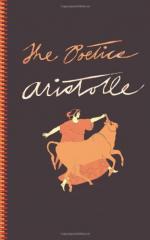
|
| Name: _________________________ | Period: ___________________ |
This quiz consists of 5 multiple choice and 5 short answer questions through Section III.
Multiple Choice Questions
1. What does Aristotle believe to be most fit to handle grand metaphors and strange words?
(a) Great poets.
(b) An educated audience.
(c) The "heroic" measure or hexameter.
(d) Analogies.
2. Into how many parts does Aristotle divide the plot of a tragedy?
(a) Three.
(b) Four.
(c) Two.
(d) Aristotle does not divide the plot of a tragedy, but rather sees it as a whole.
3. Based on Aristotle's teachings, if the main character of a tragedy is totally without fault, his fall would not be due to his own fault, but rather what?
(a) A bad attitude.
(b) His own creation.
(c) Poor fortune.
(d) His mother.
4. What does Aristotle identify as the most essential element of tragedy?
(a) Rhyme.
(b) Plot.
(c) Irony.
(d) Character.
5. Per Aristotle, what quality does a finer form of art have?
(a) Current words.
(b) Effective in fewer worlds.
(c) Effective with good or bad rhythm.
(d) Effective with fewer metaphors.
Short Answer Questions
1. What example does Aristotle provide of recognition occurring through the will of the poet?
2. Concerning what Aristotle says about the conclusion of a tragedy, which of the following statements is FALSE?
3. In poetry, Aristotle explains that the "Recognition" is almost always what?
4. Based on Aristotle's teachings, in what way does a poet use words?
5. What men does Aristotle consider to be "lower" types?
|
This section contains 320 words (approx. 2 pages at 300 words per page) |

|




